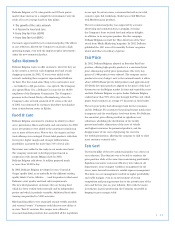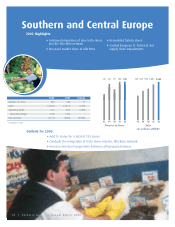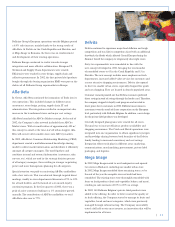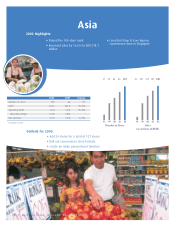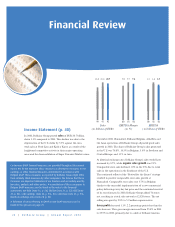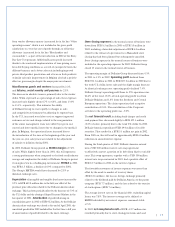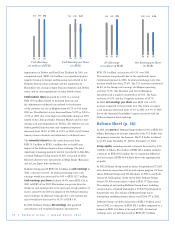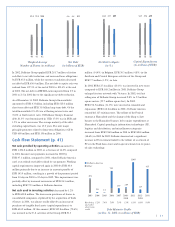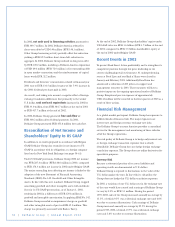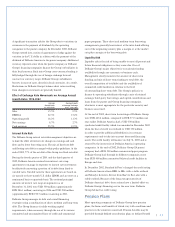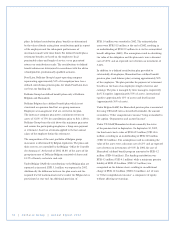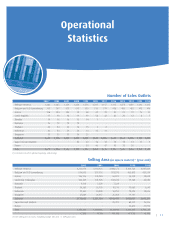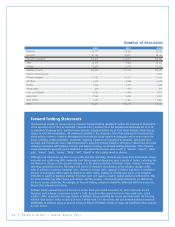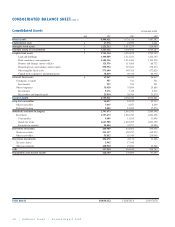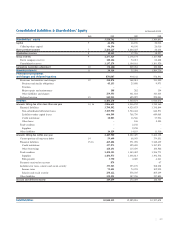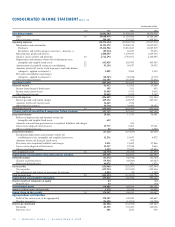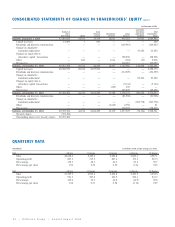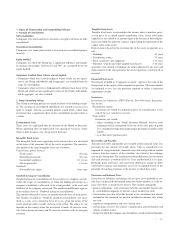Food Lion 2002 Annual Report Download - page 35
Download and view the complete annual report
Please find page 35 of the 2002 Food Lion annual report below. You can navigate through the pages in the report by either clicking on the pages listed below, or by using the keyword search tool below to find specific information within the annual report.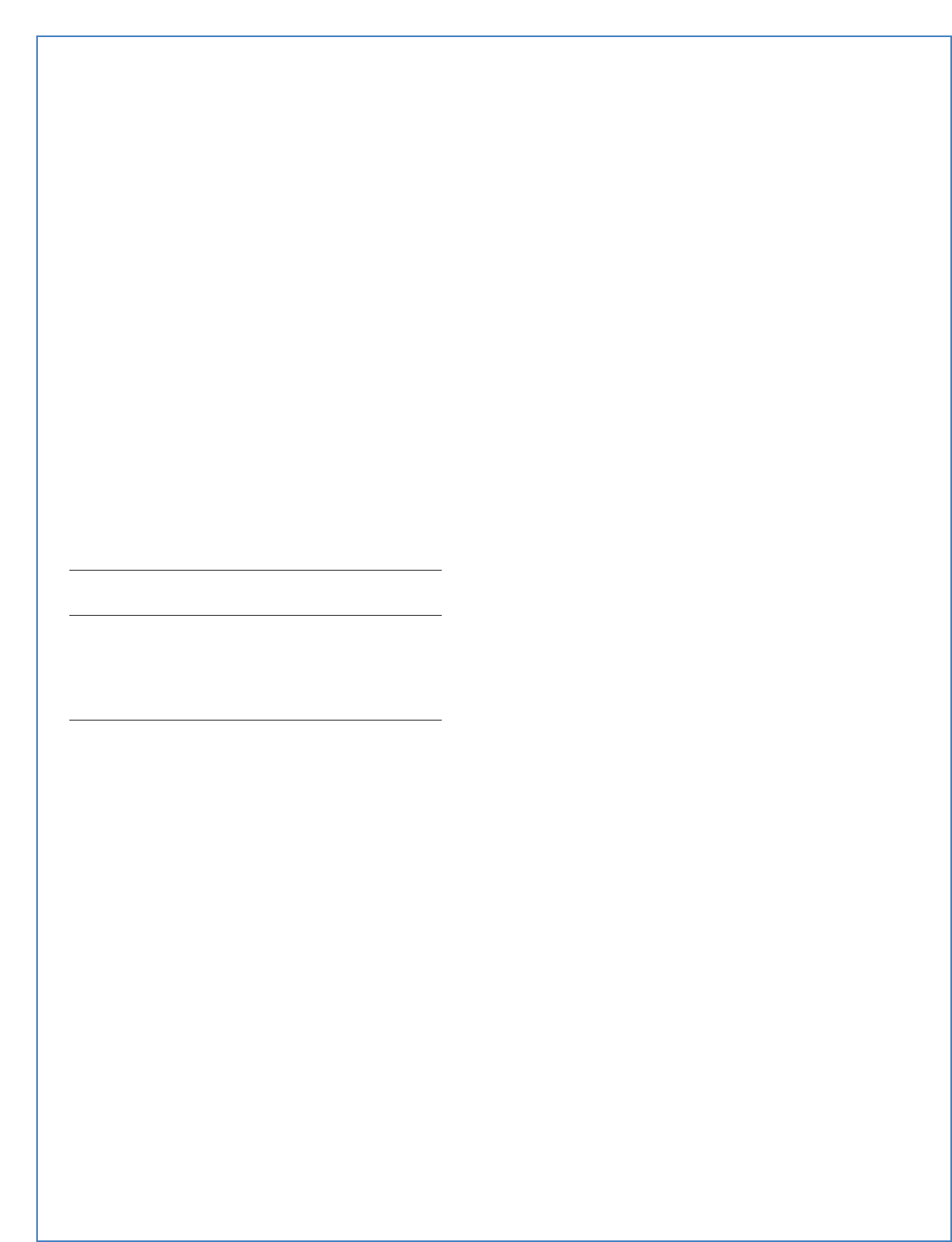
|33
A significant transaction risk for the Group due to variations in
currencies is the payment of dividends by the operating
companies to the parent company. In December 2002, Delhaize
Group entered into a series of agreements to hedge against the
variation in the U.S. dollar in relation with the payment of the
dividend of Delhaize America to the parent company. Additional
currency exposure arises when the parent company or Delhaize
Group’s financing companies finance the Group’s subsidiaries in
their local currency. Such intra-Group cross-currency lending is
fully hedged through the use of foreign exchange forward
contracts or currency swaps. Delhaize Group’s subsidiaries
borrow, in most of cases, directly in local currencies. As a result,
fluctuations in Delhaize Group’s balance sheet ratios resulting
from changes in currencies are generally limited.
Effect of Exchange Rate Movements on Average Annual
Growth Rates 1995-2002
Average Average Growth
Growth Rates at Average Exchange
(as published) Rates 1995-2002
Sales 15.5% 9.5%
EBITDA 22.3% 15.2%
Operating profit 18.2% 11.3%
Net earnings 8.7% 2.7%
Cash earnings 25.5% 19.5%
Interest Rate Risk
The Delhaize Group interest rate risk management objectives are
to limit the effect of interest rate changes on earnings and cash
flows and to lower borrowing costs. The mix of fixed-rate debt
and floating-rate debt is managed within policy guidelines. At the
end of 2002, 77% of the net debt of the Group was fixed-rate debt.
During the fourth quarter of 2001 and the third quarter of
2002, Delhaize America entered into interest rate swap
agreements to manage its exposure to interest rate movements
by effectively converting a portion of its debt from fixed to
variable rates. Variable rates for these agreements are based on
six-month or three-month U.S. dollar LIBOR and are reset on a
semiannual basis or quarterly basis. The notional principal
amounts of interest rate swap arrangements as of
December 31, 2002 were USD 300 million (approximately
EUR 286.1 million) maturing in 2006 and USD 200 million
(approximately EUR 190.7 million) maturing in 2011.
Delhaize Group manages its debt and overall financing
strategies using a combination of short, medium and long-term
debt. The Group finances its daily working capital
requirements, when necessary, through the use of its various
committed and uncommitted lines of credit and commercial
paper programs. These short and medium-term borrowing
arrangements generally bear interest at the inter-bank offering
rate of the originating country plus a margin or at the market
rate plus a margin at the borrowing date.
Liquidity Risk
Liquidity risk is the risk of being unable to meet all present and
future financial obligations as they come due. One of
Delhaize Group’s major objectives is to maintain funding
availability through any economic or business cycle.
Management closely monitors the amount of short-term
funding and mix of short-term funding to total debt, the
overall composition of total debt and the availability of
committed credit facilities in relation to the level
of outstanding short-term debt. The Group’s policy is to
finance its operating subsidiaries through a mix of retained
earnings, third-party borrowings, and capital contributions and
loans from the parent and Group financing companies,
whichever is most appropriate for the particular country and
business concerned.
At the end of 2002, short-term borrowings of Delhaize Group
were EUR 465.4 million, compared to EUR 571.3 million one
year earlier. Delhaize America had a USD 500 million
syndicated credit facility, which was amended in December 2002
when the line of credit was reduced to USD 350 million
in order to provide additional flexibility in its covenant
requirements and to take into account decreased financing
needs. The credit facility will mature on July 31, 2005 and is
secured by the inventories of Delhaize America’s operating
companies. At the end of 2002, Delhaize Group SA parent
company had a EUR 500 million commercial paper program.
Delhaize Group had, through its different companies, more
than EUR 400 million committed bilateral credit facilities in
Europe and Asia.
In December 2002, Standard & Poor’s changed the credit rating
of Delhaize America from BBB- to BB+ with a stable outlook
and Moody’s Investors Service from Baa3 to Ba1, also with a
stable outlook. Because of the long average maturity of
Delhaize America’s debt, these actions have a limited effect on
Delhaize Group’s financing cost in the near term. Delhaize
Group SA had no credit rating.
Pension Plans
Most operating companies of Delhaize Group have pension
plans, the forms and benefits of which vary with conditions and
practices in the countries concerned. Pension benefits may be
provided through defined contribution plans or defined benefit


